
March 2023
France:
Drive Out Macron,
Fight for a Workers Government!
Forge a Leninist-Trotskyist Revolutionary Workers Party!
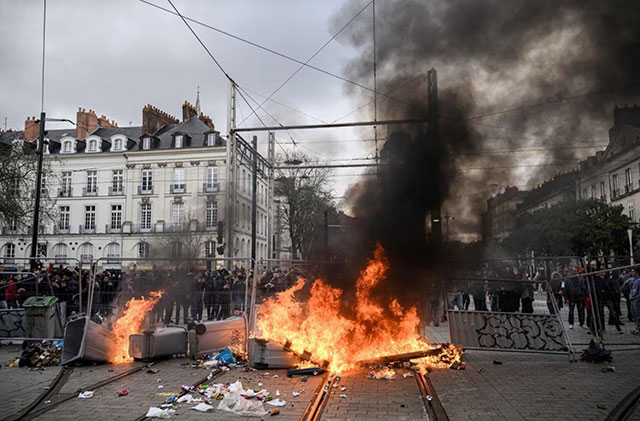
The battle lines have hardened. Demonstration in Nantes on March 20, the day the French government narrowly survived a vote of no confidence. (Photo: Loic Venance / AFP)
The forced passage of Emmanuel Macron's pension "reform" using Article 49.3 of the French Constitution of the semi-bonapartist Fifth Republic is not only the authoritarian act of a president who fancies himself “Jupiterian,” it is required by the capitalist system in full decay, which is systematically destroying the gains of past workers struggles. To defeat the assault of capital it is not enough to lead a defensive and purely “democratic” struggle, it is necessary to go on the offensive against capitalism. With two-thirds of the population of France opposed to the “reform” that threatens the lives and livelihoods of all workers, it is possible to defeat the Macron regime ... on the path of struggle for socialist revolution.
It Is
Necessary to Organize an
All-Out General Strike to
Shred
the French Pension “Reform”
Garbage collectors, Utility Workers, Railroad Workers, Transit Workers, Refinery Workers, Port Workers, Postal Workers, Teachers, Hospital Workers – All Out Together!
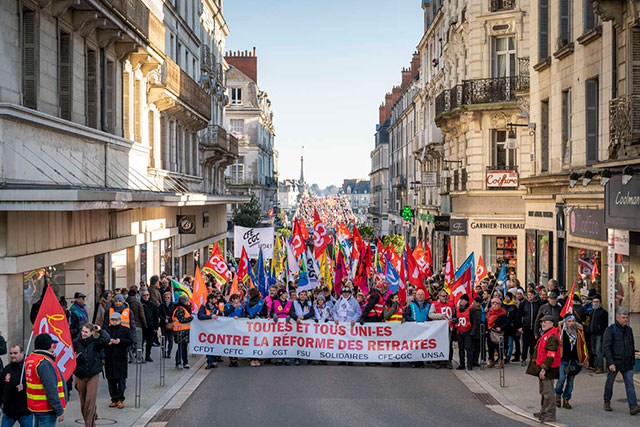
The protest marches against the attack on pensions have united all the trade-union federations, but without moving the capitalist government an inch. Above, demonstration in Blois, February 7. To win, we must mobilize the strength of the working class in an all-out general strike. (Photo: Cyril Chigot / Divergence pour Le Monde)
Mobilize our forces to impose:
- Full
pensions at the highest level for all
- A sliding
scale of wages and hours to adjust for
inflation and eliminate unemployment – 30
hours work for 40 hours pay
- Elimination of short-term contracts
and other forms of employment without job
security – A big wage hike for
low-paid workers – A minimum monthly
wage of 2,500 euros, with COLA
- Free day care – Equal pay for equal work
- Full citizenship rights for all immigrants
- Workers boycott of arms shipments to
Ukraine – Defeat the U.S./EU/NATO imperialist
war drive against Russia and China!
MARCH 26 – We are into the third month of mass mobilization against the anti-worker pension “reform” of French banker-president Emmanuel Macron. Faced with massive opposition to raising the retirement age from 62 to 64 in order to maintain the “competitiveness” (read, profits) of French capitalism, on March 15 the would-be “Jupiter-like” president resorted to the deeply anti-democratic Article 49.3 of the Constitution1 to push through his wrecking of the pension system without a parliamentary vote. Four days later, the embattled government of his prime minister Elisabeth Borne barely survived a parliamentary vote of no confidence. And then on March 22, in his TV interview on TF1 and France 2, Macron arrogantly referred to demonstrators opposing his plans as a “mob” of “seditious” troublemakers. The result: a veritable explosion of popular fury.
Millions of working people in France have had it with this president of the rich and his tantrums. Instead of running out of steam, as Macron and his team of political operators at the Elysée Palace and Hotel Matignon2 hoped, the union-led mobilizations on March 23 were bigger than ever: 3.5 million demonstrators across the country according to the CGT labor federation, 800,000 in Paris. “Who are the rioters? Who are the scum? Macron resign!” chanted angry demonstrators in Le Havre. Unlike in previous confrontations, strikes by sanitation workers, rail and transit workers, in the power plants, ports and refineries – where trade-union organization is relatively strong, and the workers have strategic weight – have begun to converge in time. And youth came out en masse, particularly high school students, now that they have finished their baccalaureat (final exams).
Acutely aware that his regime has a narrow base of support, that millions voted for him only to keep out the fascist Rassemblement National (RN) and that the proletariat has not been vanquished, Macron responded with savage repression. Peaceful protesters are teargassed and beaten with batons. As in the “Yellow Vest” protests of 2019, victims are losing eyes, hands or thumbs to police grenades. Now Macron is targeting workers in key industries with requisition orders – penalty, six months prison and a €10,000 fine for those who refuse forced labor. But in a victory which points the way forward, on March 24 hundreds of workers from ports and plants in Normandy, along with strike supporters bussed in from Paris came to the aid of strikers at the Total Normandie refinery at Gonfreville-l’Orcher, facing down police and reestablishing the picket line.
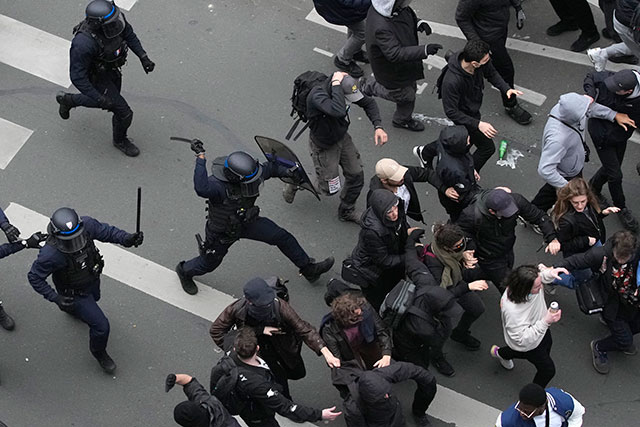
Police attack demonstrators in Paris, March 23. (Photo: Christophe Ena / AP)
The union bureaucracy has reacted passively throughout. Ever since January 19, it has put forward no other strategy than bi-weekly one-day mobilizations. Now it offers, at most, more of the same – next date, March 28 – as some, like Laurent Berger of the CFDT, want to call off the marches while looking to the Constitutional Council to rescue them. This is the same recipe for defeat that the trade-union misleaders have followed for decades, and which led to the failure of the 2010 mobilizations against raising the retirement age to 62. Macron’s intransigeance has led even the servile social-democratic CFDT tops to join the Intersyndicale, the cartel of union federations piloting the protests. But this unaccustomed unity at the top is on the basis of class collaboration, and the bureaucrats are now reduced to pleading with Macron to not actually implement his plan.
To fight to win this crucial class battle requires taking control of the strikes away from the venal bureaucrats, who are deeply entwined with the capitalist state. It is necessary to oust these “labor lieutenants of the capitalist class” as Lenin called them, quoting the American socialist Daniel De Leon, and to forge a revolutionary leadership of the trade unions on a program of intransigent class struggle. To start, it means going beyond local coordinating committees to form elected strike committees to unite all union members, and also non-union workers, some of whom will be exemplary strike militants. It means building mass picket lines that no one crosses, to spread the strike and defend strikers. And it calls for an elected national strike committee, recallable at any time. Facing a hard-nosed enemy, relying on a few key sectors will not win a victory for all working people “by proxy.”
 In 2010
as well, it was necessary to mobilize the power of the
working class to stop Sarkozy's pension "reform." Read
coverage by The Internationalist, with several articles
(including on the spot reports) on the struggle in
France. (Clic on image to download pdf)
In 2010
as well, it was necessary to mobilize the power of the
working class to stop Sarkozy's pension "reform." Read
coverage by The Internationalist, with several articles
(including on the spot reports) on the struggle in
France. (Clic on image to download pdf) Many on the left look to “renewable” strikes (grèves reconductibles), whose continuation is voted on each day in assemblies of strikers (assemblées générales, or AGs), as some kind of alternative to endless “days of action” with giant balloons, tasty sausages and evocative recordings of Le temps des cerises3 … but which lead nowhere. However, renewable strikes can be tolerated by the pro-capitalist labor bureaucracy, and they are no substitute for mobilizing the power of the working class, at the head of all the oppressed, in all-out class struggle. As was the case with the “reform” of then-president Nicolas Sarkozy in 2010, in order to defeat Macron’s determined push to gut pensions, setting the stage for further raising the retirement age, it will take nothing less than an unlimited general strike – not a one-day or two-day pseudo-strike, or a “renewable” strike, but a struggle to the end – which will inevitably pose the question of power, and therefore the fight for a workers government.
There is a burning necessity to extend the strike movement, particularly to the private sector (including notorious anti-union employers like Amazon). To go beyond narrow strikes by category, it is necessary to raise a platform of class struggle which can serve as a bridge from the most immediate felt demands of today to the goal of socialist revolution, as Leon Trotsky put forward in the Transitional Program (1938). Not just returning to retirement at age 60 (55 for unhealthy occupations) and defending the special regimes (SNCF, RATP, EDF, etc.) against attack by the bosses’ state, but fighting for full pensions for all at the highest levels. Against the hollowing out of the law for a 35-hour workweek and merciless exploitation (which led to the notorious wave of suicides at France Télécom), fight for a sharp reduction in hours with no loss in pay, creating new jobs.
Such a program (see page 1) would address the discrimination against women by the lengthening of requirements of uninterrupted work,4 as well as demanding free day care. It would address the low-paid precarious employment of young workers, and the threat of regimentation under Macron’s “national service” schemes, demanding a big increase in the minimum wage and job security for all. As a step toward workers control, it would systematize EDF workers’ actions in providing free energy to sectors and households at risk. With immigration next up on Macron’s hit list, it would fight for full citizenship rights for all immigrants, and for workers action to stop deportations. And against repression, as Trotsky wrote: “In connection with every strike and street demonstration, it is imperative to propagate the necessity of creating workers groups for self-defense.”
The Left Adrift
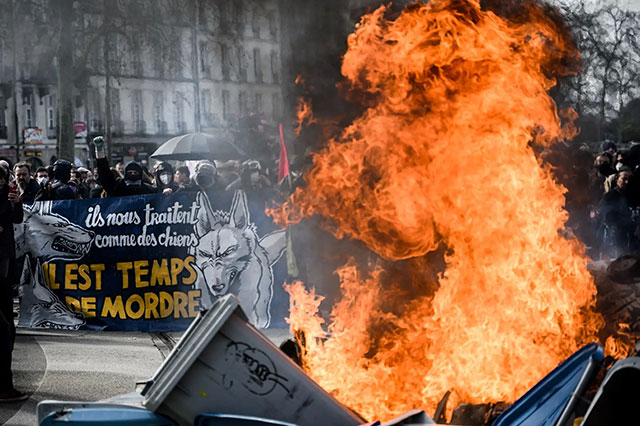
Ten huge “well-behaved” mobilizations with more than a million demonstrators each failed to stop Macron. “They Treat Us Like Dogs. It’s Time to Bite," proclaims the banner, in Nantes on March 15. Absolutely, but how? It is necessary to mobilize the power of the working class in an unlimited general strike that paralyzes the country. And that poses the question of power, that is, of the capitalist state. (Photo: Loic Venance / AFP)
Above all, the battle royal over pensions is a political struggle against the capitalist state, and against imperialism. No matter who is at the helm – whether the right-wing Macron government, a fascist-led government under Marine Le Pen (akin to Giorgia Meloni in Italy), or a “left” populist like Jean-Luc Mélenchon, backed by reformist union tops and leftists in a new “popular front” – all these are or would be bourgeois governments. They will do the bidding of capital, which is on the warpath, using every crisis from the COVID pandemic to the U.S./EU/NATO war on Russia to prop up profits, beef up its repressive forces and crack down on workers and any threat to its class rule. As the ruling class dispenses with the forms of parliamentary “democracy” (49.3 to the rescue), a workers government must be based on workers councils (soviets) built in the course of struggle.
Macron brandishes the spectre of fascism to smear those demonstrating against his anti-worker “reform,” talking of “sedition” and using the loaded expression “factieux” – the same term used for fascists in the 1930s and OAS (Secret Army Organization) terrorists in the Algerian War – while cynically equating protesters to the 6 January 2021 riots by fascistic Trump supporters in Washington and the 8 January 2023 imitation by fascistic Bolsonaro supporters in Brasilia. In fact, the sinister fascist Rassemblement National of Le Pen is waiting in the wings, but its feigned opposition to Macron’s “reform” is pure demagogy. The RN is against the strikes, and it echoes the bourgeois lies that the pension system will be overwhelmed by a longer-lived population. Its solution? To purge “foreigners” – meaning the immigrant workers who are vital to whole sectors of the economy.
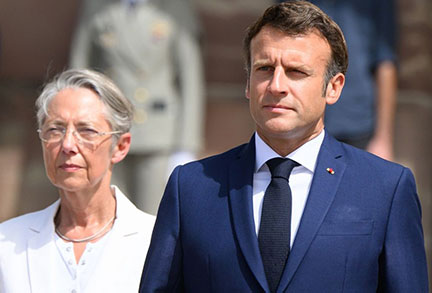 Aspiring Bonaparte Emmanuel
Macron and his prime minister Elisabeth Borne at a meeting
with union leaders in December 2022. To defend the interests
of capital, they govern by decree.
Aspiring Bonaparte Emmanuel
Macron and his prime minister Elisabeth Borne at a meeting
with union leaders in December 2022. To defend the interests
of capital, they govern by decree. (Photo : Jacques Witt / SIPA)
The semi-bonapartist Fifth Republic, ushered in by a military coup d’état in 1958 and presided over in its early years by General Charles de Gaulle, is in fact in crisis, its “democratic” façade splintering as THE hapless prime minister Borne has used section 49.3 eleven times to enact measures for which she did not have a legislative majority. Actually, the “left” government of François Mitterrand outdid Macron, using the same clause some 28 times to push through anti-popular measures, including restructuring the military and privatizing Renault. But there should be no illusions that a Sixth Republic, long advocated by Mélenchon and his La France Insoumise (LFI – France Unbowed), would be more democratic. While the “left” nationalist líder máximo may assume the airs of a Latin American caudillo, on the French terrain he is reduced to parliamentary histrionics.
Mélenchon (like Le Pen) is peddling an imaginary referendum as an antidote to the attack on pensions. Yet that would require rounding up 4.87 million signatures (10% of the electorate) on a petition in the nine months after the pension “reform” went into effect, the text of which would then be sent to the Senate and Chamber of Deputies, which are not required to act on it. In short, it’s a dead-end.
As Macron and the bourgeois media whip up hysteria in backing Ukraine, whose fascist-infested regime was installed by an imperialist-sponsored coup in 2014, Mélenchon is fully on board with the imperialist war drive via the U.S./NATO proxy regime in Kiev. The large majority of the opportunist left has joined him in railing against Russia, a capitalist regional power, and China, a bureaucratically deformed workers state – which uniquely was able to contain the ravages of the COVID-19 pandemic by mobilizing the resources of a collectivized economy. The once pseudo-Trotskyist, now thoroughly social-democratized leadership of the Nouveau Parti Anticapitaliste (NPA, New Anti-Capitalist Party) has been sucked into NUPES (New Ecological and Social Popular Union), a ramshackle popular front built around Mélenchon/LFI and the reformist Communist Party (PCF).
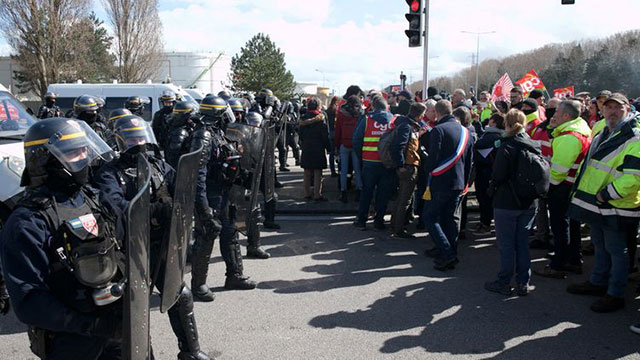
To break refinery workers strike, Macron resorted to requisitioning strikers – ordering them to return to work or be jailed. Above, police at the Gonfreville-L’Orcher refinery, near Le Havre, on March 24 confront strikers, who maintained their strike picket. To defend picket lines, form workers self-defense groups. (Photo: Lou Benoist / AFP)
While the CGT/CFDT/FO tops look to influence the Constitutional Council with strikes, the various “far left” organizations are, as usual, acting as the “left” face of the union bureaucracy, their ritual calls for a “general strike” seeking to push the Intersyndicale slightly to the left. While the NPA leadership of Olivier Besancenot and Philippe Poutou is by now a mere appendage of the LFI/NUPES popular front, Lutte Ouvrière (LO, Workers Struggle), led by Nathalie Arthaud, is virtually silent on the key question: what is to be done? Its editorial for this week (“The Workers’ No Confidence Motion Is the Strike”) declares: “What the government is doing, the workers on strike can undo!” (Lutte Ouvrière, 24 March). That’s all! LO is getting ready to blame the working class itself for the crisis of proletarian leadership.
For its part, Révolution Permanente (RP, French affiliate of the misnamed international Trotskyist Fraction [FT]), after fleeing the sinking NPA and setting up shop last December, a few weeks ago was observing that there was not a revolutionary crisis in France, while advising Mélenchon’s LFI to be more “Jacobin” and call for abolition of the Senate and to form a single legislative assembly in its putative Sixth Republic. Back in 2019, the RP puffed up the Yellow Vest movement into a full-blown revolutionary threat to French capitalism on account of a few attacks on the Arc de Triomphe and fire-bombing of an upscale restaurant. Now, following the “democratic coup d’état” (!) of Macron’s use of 49.3 and some trash bins set alight after the union mobilization on March 23, the RP proclaimed a “pre-revolutionary moment” (Révolution Permanente, 25 March).
The current vehicle for the inveterate maneuverers of the RT/FT is a “Network for a General Strike,” to promote “renewable strikes” everywhere. But this “network” and its “action committees for a general strike” are basically front groups of RP sympathizers to pressure union bureaucracy into calling a generic “general strike.” Yet a general strike posing the question of power while led by pro-capitalist labor leaders cannot win. That is why in the 1930s Trotsky called for factory committees, workers councils and committees of action as organizational forms for mass working-class struggle, like the soviets in the 1917 Russian Revolution. The RT/FT’s call is a caricature of revolutionary politics, to provide a cover as it “peddles its wares in the shadow of the popular front,” as Trotsky wrote of the 1930s centrists.
The present acute crisis of the Macron regime, confronting sustained opposition by key sections of the working class backed by an overwhelming majority (more than two-thirds, according to every opinion poll) of the population, could potentially become a revolutionary situation. The law to gut workers’ pension rights can be defeated, and the would-be Bonaparte could be driven from the Elysée Palace. But that will not be accomplished by parliamentary pressure politics and endless popular-front parades, from Place de l’Opéra to the Bastille, from Place de la République to Place de la Nation, etc. It can only be the by-product of a revolutionary struggle for power, of an all-out general strike, which requires the leadership of a genuinely communist party of the proletarian vanguard.
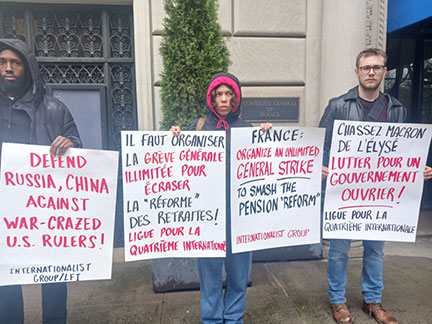 Protest outside French
consulate in New York, April 1, in solidarity with the
struggle against the anti-worker pension “reform.” (Internationalist photo)
Protest outside French
consulate in New York, April 1, in solidarity with the
struggle against the anti-worker pension “reform.” (Internationalist photo)The battle over pension rights in France has been a constant for the last 30 years, going back to Premier Edouard Balladur’s 1993 plan to reduce private-sector pensions and Premier Alain Juppé failed attack on the “special regimes” of the most powerful unions. As virtually every bourgeois commentator has noted, the outpouring of opposition to Macron’s “reform” is because it amounts to a frontal attack on social solidarity programs central to the “French way of life.” And as every French worker knows, key aspects of those programs were the product of huge social struggles. The month-long vacations were the result of the 1936 general strike. But that gain was a “consolation prize,” resulting from the betrayal of that strike – which had the potential of turning into a proletarian revolution – by the Stalinist reformist PCF, experts in “know[ing] how to end a strike,” in ’36 and again in ’68.5
The key is revolutionary leadership. Without it, the mobilization that has produced ten enormous mass marches will be for naught. Left to their own devices, the union misleaders will aid Macron in running the protests into the ground. A few nights of “wildcat protests” roaming the streets, battling the cops and setting fire to trash bins will not change that. The fact that, so far, the bulk of the population “understands” (and tacitly supports) those “riots” indicates awareness that the biweekly marches have been insufficient. But this state of affairs will not last. Either the full power of the working class is mobilized in hard class struggle or the forces of capital, headed by the 45-year-old banker-president, will prevail – and millions of working people will pay a heavy price.
The struggle to forge a workers party on the Bolshevik program of Lenin and Trotsky, acting as a champion of all the oppressed, fighting for a workers government and international socialist revolution, is key to the battle over pension rights in France. This cannot be separated from the fight for workers action against the imperialist war drive. The failure of the general strike of 1936 and the blocking of proletarian revolution by the popular front of Léon Blum, together with the defeat of the popular-front Republican forces in the Spanish Civil War, led to the victory of Marshall Philippe Petain and Generalissimo Francisco Franco, and the slaughter of the second imperialist world war. Today as the U.S., NATO and EU imperialists hurtle toward a thermonuclear World War III, the stakes are as high, or higher. ■
- 1. Article 49, Paragraph 3 of the Constitution of the Fifth French Republic, adopted in 1958, states that the prime minister may “invoke government responsibility before the National Assembly for the vote on a bill concerning finances.” It would then be “considered to be adopted” without a vote by parliament, unless the government is brought down in a no-confidence motion within 24 hours. With its arcane language, this clause allows the government to rule by decree on budget matters. While the clause itself negates any pretense of parliamentary democracy, using it to ram through a major change in social legislation is a naked expression of the dictatorship of the bourgeoisie.
- 2. Seat of the offices of the president and prime minister, respectively.
- 3. Le temps des cerises (Cherry Blossom Time), is a haunting song written by French composer Jean-Baptiste Clément, a fighter in the Paris Commune, who dedicated it to a nurse who fought in the Semaine Sanglante (Bloody Week) in May 1871 when French troops overthrew the Commune, massacring thousands (and subsequently executing tens of thousands of communards).. The verses evoke a time after a revolution when oppression and exploitation have been overcome, and the suffering that brought this about.
- 4. Raising the required number of years of continual employment sharply limited the eligibility and lowered pensions for women who had left the work force for a number of years to care for their children.
- 5. In
the June 1936 general strike, after negotiations with the
popular-front government of Léon Blum leading to the
Matignon Accords (including paid vacations), Communist
Party leader Maurice Thorez famously said “it is necessary
to know how to end a strike.” Militant workers sought to
continue the strike, and did for several days. In May
1968, the PCF leader of the CGT labor federation, Georges
Séguy, negotiated the Grenelle Accords with the government
of de Gaulle, calling for a return to work in exchange for
a wage increase. Metal workers in auto plants rejected the
agreement, and the general strike continued, but with the
PCF and CGT against them, it petered out a week later
while pockets of militancy were crushed by the CRS
paramilitary riot police. In both cases, the Stalinists
acted to head off workers revolution.
